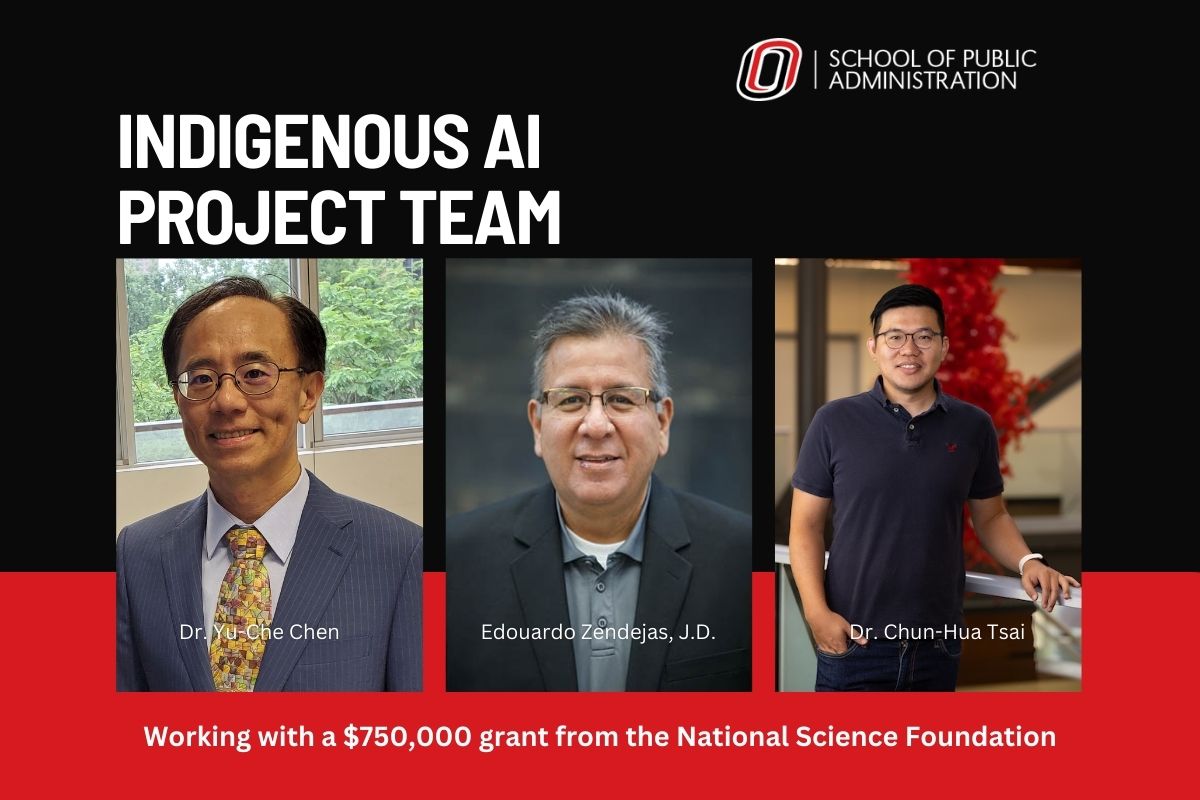Elevating Indigenous Voices in AI: A Journey Toward Abundant Intelligence
- published: 2024/09/18
- contact: Debbie Vihstadt - College of Public Affairs and Community Service
- phone: 402.554.3033
- email: dvihstadt@unomaha.edu
- search keywords:
- Indigenous AI Co-Design Abundant Intelligence Tribal Sovereignty

The University of Nebraska at Omaha's (UNO) College of Public Affairs and Community Service (CPACS) supports groundbreaking research that blends cutting-edge technology with the wisdom of Indigenous communities. Backed by a $750,000 grant from the National Science Foundation, this initiative—led by Dr. Yu-Che Chen, interim director of the University of Nebraska at Omaha’s School of Public Administration, alongside a dedicated team of researchers and Indigenous collaborators—is reshaping how artificial intelligence (AI) is developed, implemented, and understood.
The project team includes Edouardo Zendejas, J.D., co-founder and director of UNO's Tribal Management and Emergency Management Program, and Dr. Chun-Hua Tsai, assistant professor of information systems and quantitative analysis. Collaborating closely with Indigenous communities, the team is ensuring that the AI systems developed align with and honor the cultural values of those they are designed to serve.
Bridging Worlds: AI Meets Indigenous Communities
In today’s digital landscape, AI is rapidly becoming essential in shaping the future. For many Indigenous communities, there is a pressing need to ensure these technologies serve their unique cultural and societal needs. This project works hand in hand with tribal nations to build AI systems that respect and incorporate their perspectives.
"We have found that Indigenous communities are not just interested in AI—they’re eager to be active participants in shaping how it evolves," said Chen. "Their desire to control their own data and digital identities is a powerful driver for ensuring AI aligns with their values."
A recent milestone in this project was an invitation for the team to present at the National Congress of American Indians (NCAI). Their panel "Indigenous Artificial Intelligence: Empowering Authenticity," highlighted the importance of tribal sovereignty in the digital age. The NCAI, representing more than 200 of the 574 federally recognized tribes in the U.S., provided a platform for critical discussions on how technology intersects with Indigenous rights.
The Power of Co-Design
This collaboration has revealed how essential it is to involve Indigenous communities directly in AI design. This participatory approach fosters greater trust and creates technologies that are more relevant and useful to the people they serve.
Tribal nations became more invested because they saw that their input was not only valued but critical to the project’s success. It’s no longer about us designing for them—it’s about designing with them."
"As soon as we adopted a co-design approach, the dynamic changed," Chen explained. "Tribal nations became more invested because they saw that their input was not only valued but critical to the project’s success. It’s no longer about us designing for them—it’s about designing with them."
This approach has been validated through ongoing surveys and feedback from the communities involved, further reinforcing the idea that collaboration leads to more successful and trusted outcomes.
Discovering Abundant Intelligence
A concept that emerged from the team’s work is the notion of "abundant intelligence." Unlike the traditional singular idea of artificial intelligence, abundant intelligence reflects a broader, more inclusive perspective—one that encompasses multiple forms of intelligence and interconnectedness.
"Indigenous communities have been instrumental in broadening our understanding of what intelligence means," said Chen. "They talk about abundant intelligence, which is more than just a technological construct. It represents a diverse, interconnected way of thinking that has influenced how we approach AI."
This insight has reshaped the project’s goals, pushing the team to think beyond conventional AI models and explore new, more inclusive frameworks for technology development.
Addressing Bias in AI
Another critical aspect of this project is tackling bias in AI, particularly how large language models can perpetuate harmful stereotypes about Indigenous people. By engaging directly with tribal communities, the team is developing AI tools that more accurately reflect their realities.
"We’ve seen how AI systems trained on biased data can reinforce negative stereotypes," Chen noted. "Our project is working to correct that by ensuring the voices of Indigenous people are heard and integrated into these systems. It’s not just about avoiding bias—it’s about creating AI that empowers."
Looking Ahead
The journey is just beginning. Alongside the ongoing work in Indigenous AI, the project has expanded to explore equity in advanced computing, creating tools and dashboards that help marginalized communities access and benefit from emerging technologies.
"This project is about more than just AI," said Chen. "It’s about equity, representation, and ensuring that all communities, especially those historically marginalized, have a voice in the future of technology. We’re excited to continue this work and see where it takes us."
As CPACS continues to support innovative, community-driven research, the focus remains clear: creating inclusive technologies that serve everyone.